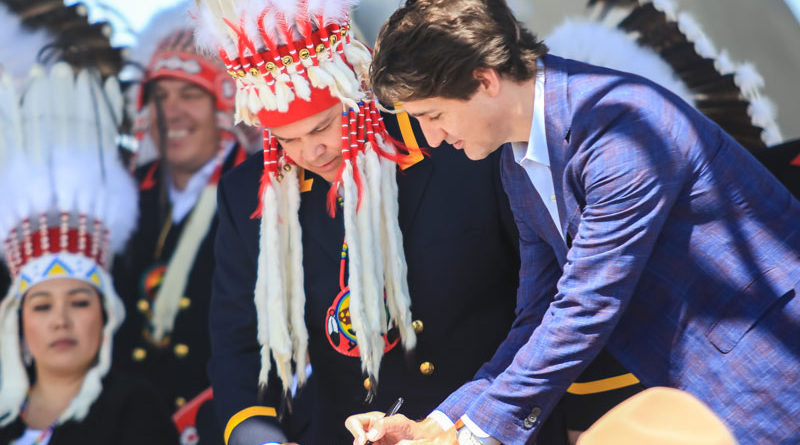Canada, Siksika Nation sign historic land settlement agreement
By John Watson Local Journalism Initiative Reporter

John Watson Photo
The Government of Canada and Siksika Nation met on the Treaty Flats on June 2 to officially sign a $1.3 billion land claim settlement.
Siksika Nation Chief and Council voted on Dec. 16 and 17, 2021 to accept the global settlement agreement with the Government of Canada to resolve the country’s oldest and largest land claim.
Prime Minister of Canada Justin Trudeau spoke during a ceremony to commemorate the agreement at the site of the original signing of Treaty 7.
“We are gathered today to right a wrong from the past. A wrong, as Chief Crowfoot has said before, that should never have happened, and I agree,” said Trudeau. “The first Chief Crowfoot … said that he hoped that the government would be charitable to his people, but as we all know, during the 1910 surrender and subsequent action, the government acted dishonourably.”
The Government of Canada at the time of the original 1910 surrender requisitioned 125,000 acres of land from Siksika Nation. Of that, 115,000 acres was sold at auction in 1917. The remaining 10,000 acres was returned to Siksika.
Chief Ouray Crowfoot spoke passionately at the ceremony, commending his council and his people for their resilience and spoke about using the settlement to move forward.
“Canada needs to stop using the word reconciliation. $1.3 billion, that is a lot of money, but it will never make (Siksika) whole of what it was before,” said Crowfoot. “What the $1.3 billion can do is provide economic opportunities … and I do see the tide changing for Siksika. I see us becoming a thriving nation.”
Crowfoot spoke about using some of the money to develop local education, language support and policing, among other initiatives to build Siksika Nation
“It’s not about reconciliation. At this point, it’s about moving forward. We’re never going to reconcile, you’re never going to make it better, you’re never going to make it right,” said Crowfoot. “Let’s just do what we got to do now to go forward. I think Siksika, we have the foundations in place (and) we’re moving in the right direction … there is a bright future for Siksika.”
In December 2021, approximately 70 per cent of eligible Siksika voters turned out to polls in Siksika Nation to vote on the settlement agreement.
Of those who responded, 77 per cent reportedly agreed with the settlement, which noted the following claims:
• The 1910 Surrender and 1960 Petition of Rights Claims: the unlawful surrender of 115,000 acres of reserve land and breach of Canada’s fiduciary duties related to reserve lands.
• Canadian Pacific Railway breaches of duty in taking reserve land for use by third parties in connection with the CPR.
• Flooding of and release of sewage onto the reserve without Siksika’s permission (Cluny).
• Unlawful taking of 500 acres of the reserve for the Bow River Irrigation Project, related to the creosote contamination claims.
During the meeting, Trudeau said his ultimate goal is to continue building trust and bettering Canada’s relationship with Siksika Nation.
Regarding Siksika’s plans to develop the nation and introduce programs, Trudeau added Ottawa intends to take a backseat, but to be there if Siksika asks for help.
“We are interested in being there as a resource to allow (Siksika) to develop the programs and the path forward, but the less Ottawa has to say in how they get built, set up and run, the better,” said Trudeau. “It needs to be something that is driven by Siksika Nation (and) it has to suit them. We are there as partners with experience and we can make sure the resources are there, but no matter how right the solution might be, if it comes from Ottawa, it can’t be the right solution. It needs to be informed and led by (Siksika) itself.”
Crowfoot added Siksika does not intend to wait for Ottawa and will begin implementing its local initiatives and programs as soon as possible.
